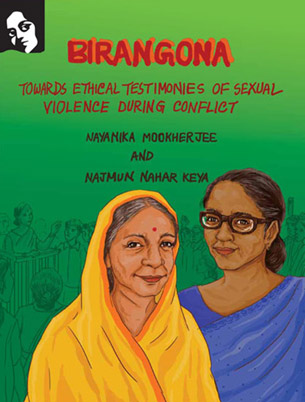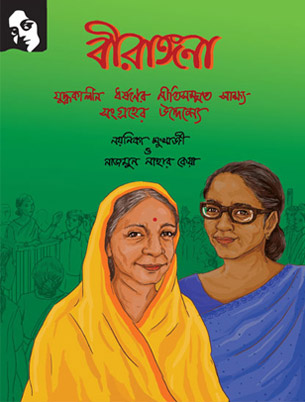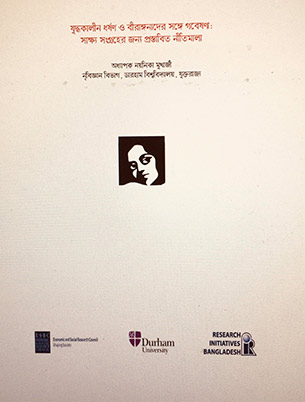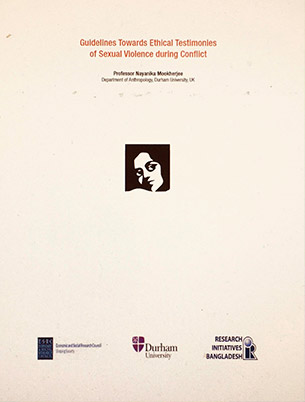How to cite
HOW TO CITE
The graphic novel and animation film
Mookherjee, Nayanika and Najmunnahar Keya. (2019) Birangona: Towards Ethical Testimonies of Sexual Violence during Conflict. Durham: University of Durham. Freely Available in Bangla and English from: /how-to-cite/ 2019. Praxis Award from the Washington Association of Professional Anthropologists for the project: ‘Birangona: Towards Ethical Testimonies of Sexual Violence During Conflict’. https://wapadc.org/2019-Praxis-Award
English Graphic Novel http://doi.org/10.15128/r1sb3978287
English Animation Film http://doi.org/10.15128/r1jq085k00x
Bangla Graphic novel http://doi.org/10.15128/r1r494vk23d
Bangla Animation film http://doi.org/10.15128/r1cj82k7349
(Please use these dois when citing the graphic novel/animation films)
Animation film in English
Durham University ©
Film direction: Nayanika Mookherjee, Nazmunnahar Keya
Storyline, Text and Dialogue: Nayanika Mookherjee
Graphic Artist: Nazzmunnahar Keya
Voiceover Artists: Jesmin and Apu Chowdhury
Music: Artlist
Animation: Clearhead Media Ltd
Production Manager: Stefan Christopher
Animation: Simon Brooke
Published by: Arifur Rahman, Noktaarts, Dhaka, Bangladesh
Editorial Assistance: Rashida Akter, Anita Datta, Raihana Ferdous, Yaeshir Arafath Borno
Guideline, Graphic Novel and Animation Film is downloadable/viewable in Bangla and English from: www.ethical-testimonies-svc.org.uk
For further queries, comments, information about this project and printed copies of the graphic novel,
please contact [email protected].
These resources have been developed by Professor Nayanika Mookherjee (Anthropology, Durham University) in collaboration with Research Initiatives Bangladesh (RIB) and have co-created this guideline, graphic novel and animation film in consultation with various stakeholders in Bangladesh and UK. This is a follow-on project from Nayanika’s book [The Spectral Wound: Sexual Violence, Public Memories and the Bangladesh War of 1971. Durham: Duke University Press (2015); Delhi: Zubaan Books (2016)]. Detailed findings from the original research can be found here.
As part of this project, we have produced this website, a set of guidelines, a graphic novel and an animation film outlining how to ethically record testimonies of sexual violence. The graphic novel, guideline and animation film are freely downloadable/viewable from the website. The guidelines, graphic and animation film novel has been funded by the ESRC’s Impact Acceleration Account and Durham University’s Research Impact Fund.
How you can use the content
If you wish to use the content in a commercial context (eg a publication, CD or website the public needs to pay for to obtain, or a project such as a broadcast series or film), please contact us to obtain permission. If you wish to use this content under ‘fair dealing’ terms (eg. as an educational resource or teaching material) or for a non-commercial project (eg. for educational research or exhibition), you may do so, but should acknowledge the source as ethical-testimonies-svc.org.uk. Images can be utilised as part of the website for such non-commercial use. The copyright for the photographs are held by individuals/ organisations listed, and permission will be needed from the copyright holders if you intend to reproduce these.
Use of content from the archive does not give you any sublicensing rights. Any organisation or individual who wishes to use the content should be aware of these guidelines and use the content directly from the site.
How to approach the content
We have provided links to download/view the guidelines, graphic novel and animation film in Bangla and English. The pages are designed to be used either on a desktop PC or projected on to classroom whiteboards.
We gratefully acknowledge the use of some of the text of this How you can use the content section from the www.striking-women.org website
Synopsis of the graphic novel and animation film
Labonno/Labony needs to do a school project on family memories of 1971, the Bangladesh War. When coming to ask her grandmother, she wakes the latter from one of her frequent nightmares. What follows is her grandmother’s (Nanu/Rehana) narration of the history of ‘birangona’ (brave women), the term given by the Bangladesh government in 1971 to honour the women who had been raped during the war. Her mother, Hena, also tells her of the Oral History Project through which they tried to collect testimonies. This leads them to talk about the various points that need to be covered for an ethical guidance to record testimonies of sexual violence during conflict (svc). But hidden in these discussions of the guidelines Labonno discovers an intricate secret family history. What could that secret be? What would Labonno feel when she hears of that secret? What will Labonno do in the future about her family and the nation’s history?
Citing the guidelines and graphic novel:
The guideline can be referenced as: Mookherjee, Nayanika (2019) Guidelines Towards Ethical Testimonies of Sexual Violence during Conflict. Durham: University of Durham. [Online] Available from: www.ethical-testimonies-svc.org.uk
The graphic novel can be referenced as: Mookherjee, Nayanika and Najmunnahar Keya. (2019) Birangonas: Towards Ethical Testimonies of Sexual Violence during Conflict. Durham: University of Durham. [Online] Available from: www.ethical-testimonies-svc.org.uk
In Bangla
In English







